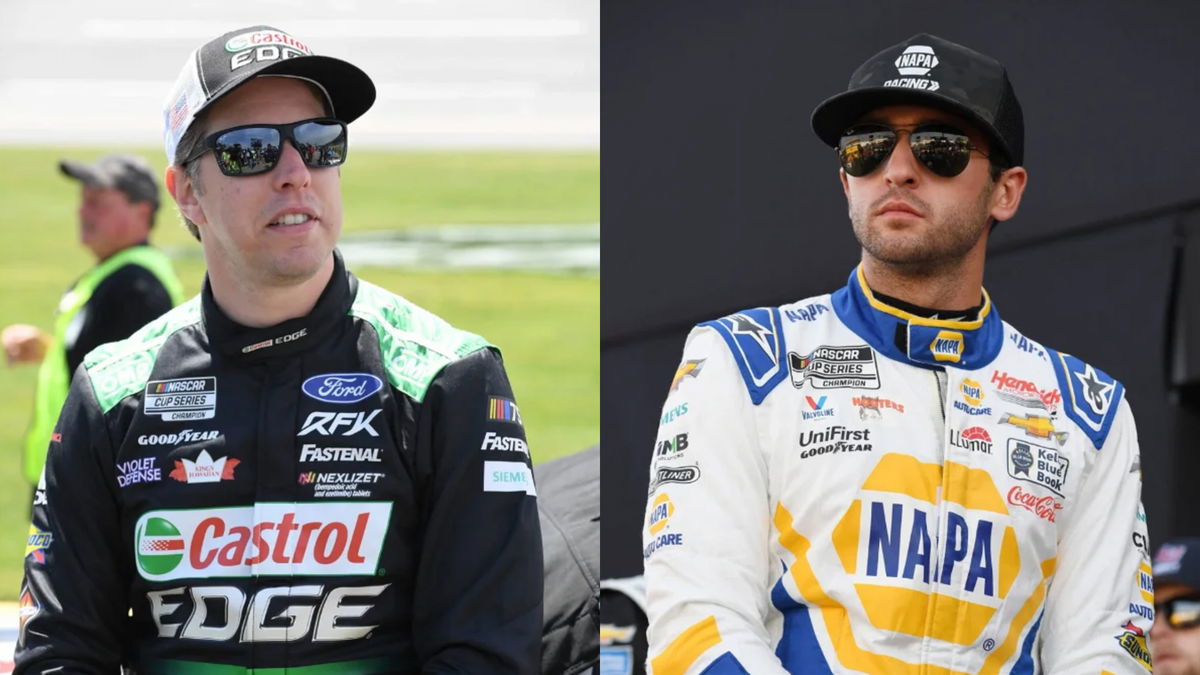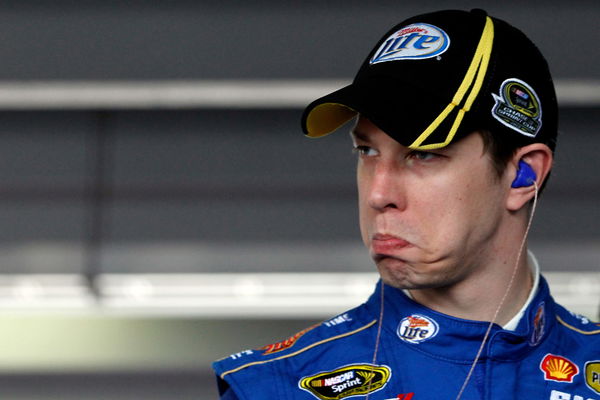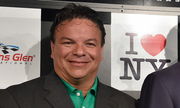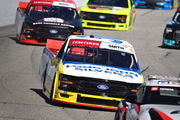
Imago
Brad Keselowski and Chase Elliott | Image Credits: Imago

Imago
Brad Keselowski and Chase Elliott | Image Credits: Imago
NASCAR is a team sport. Crew chiefs, spotters, and crew members are essential to a racing team, facilitating their drivers throughout the race and making it collaborative. However, there is a predominant aspect that glorifies the abilities of the individual who takes onto the tracks: the driver. In NASCAR, over the years, many drivers have taken up the tag of a ‘superstar.’ The star factor and glamour have increased from Dale Earnhardt to Chase Elliott. But as per RFK Racing’s driver-owner Brad Keselowski, building a brand through a driver is a crossroads for many teams.
Watch What’s Trending Now!
Ever since his transition to the role of a team owner, Keselowski has not only improved his team’s performance through his technique and experience but he also helped the team find their confidence. As the world of racing united at the inaugural Racers Forum on Wednesday, a major topic of discussion was the necessity of star power and how or whether to ingrain it into racing.
ADVERTISEMENT
Brad Keselowski and Jeff Gordon want NASCAR to be more team-oriented
In the last few years, a significant problem for NASCAR has been its connection with the fandom. Despite trying their best, NASCAR still needs to entice the fans through their initiatives, reflected in TV ratings and the turnout at racing venues. Hendrick Motorsports stakeholder and NASCAR legend Jeff Gordon also participated in the convention and expressed his thoughts about the importance of superstars in the sport.
Gordon’s statements described the situation accurately as he pointed out that the reason for the ever-diminishing connection with the fans is they favor drivers more than teams. If we take a fan of Kyle Larson as an example, his affinity is in no way toward Hendrick Motorsports. It is toward the 2021 champion, one of the best drivers, and someone who has built his brand well in the past few years.
As per Racing America, the VC of Hendrick Motorsports claimed, “I think we have a role as race teams to build our brand up, maybe not as much as the star power of the driver, but in a way where drivers — and we’ve seen this recently with Jimmie Johnson, Dale Jr., and myself, several big drivers that have huge fan followings stepped away from the sport, and I think it had a big impact on the sport.” He implied that the stars of the golden generation leaving the sport has made it less individualistic and that is a positive sign for NASCAR.
ADVERTISEMENT

Getty
HOMESTEAD, FL – NOVEMBER 16: Brad Keselowski, driver of the #2 Miller Lite Dodge, stands in the garage during practice for the NASCAR Sprint Cup Series Ford EcoBoost 400 at Homestead-Miami Speedway on November 16, 2012 in Homestead, Florida. (Photo by Tom Pennington/Getty Images)
For Brad Keselowski, the prevalent sponsor scarcity has played a vital role in toning down racing stars. Earlier, sponsors used to back their drivers to the best of their abilities. From marketing to payouts, sponsors have propagated stardom since the 90s.
ADVERTISEMENT
“Right now, there isn’t a really good ROI (return on investment) for the teams to invest — it takes a long time to invest in driver star power unless you have some inherent — you think of Chase Elliott who had the ability to build off of a name and brand, but most drivers don’t,” Keselowski said.
Whether it is 3chi with Kyle Busch, FedEx with Denny Hamlin, or McDonald’s with Bubba Wallace, sponsors try to promote the stars signed with them. But what does it mean for the team that the driver is affiliated with? Going by Brad’s words, a ‘burden.’
ADVERTISEMENT
Top Stories
Greg Biffle’s $4M Prized Possession Goes Up for Sale After Tragic Crash, Leaving NASCAR Fans Heartbroken

NASCAR World Mourns as Former Watkins Glen President Michael Printup Passes Away at 60

Fox Broadcaster Pens Heartfelt Message as Veteran Announcer Quits NASCAR

Denny Hamlin Offers First Words Since Losing Beloved Father in Anniversary Fire

3x Indy 500 Champion Driver Eyes to Live 19-YO Dream With Surprise NASCAR Return

Keselowski believes that team partners have gradually become unwilling to contribute
NASCAR underwent a revolutionary change when it opted to turn to a charter-based system. With NASCAR now handing out funds based on merit and performance, it became a significant risk for primary sponsors. As a result, many big companies had to drop out of the conversation. To look at it from a statistical point of view, 60% of primary sponsors at the Daytona 500 in 2005 were Fortune 500 companies, including some big guns like GoDaddy and Subway.
While both companies are nowhere to be seen in the Cup Series today, the decision is correct. The fall of FedEx has been the most notable example of late, with JGR reducing the company’s presence on the iconic #11 car to around half of the season. While a quarter of Fortune 500 companies are still invested in NASCAR, the situation has become alarming.
ADVERTISEMENT
Mavis Tire and Brakes, which recently acquired Tire Kingdom and has 2,000 service centers under its various brands, to be Denny Hamlin primary sponsor for Loudon, Pocono, Richmond, Michigan and Watkins Glen. pic.twitter.com/1HEPC5phuj
— Bob Pockrass (@bobpockrass) July 11, 2023
Keselowski emphasizes on the decreasing participation of partners, as he explained, “That takes a significant investment from someone. In years past, that used to be the partners. I look at a guy like Rusty Wallace, and you look at the Miller Beer company and what they did for him to build his brand. That was a big investment over a lot of years. Same with Jeff [Gordon] and DuPont. He certainly earned it with wins to go with it, and those two connect into something very powerful.”
“I think our partners are less willing to do that than they were in years past, so that really puts the burden on the team to do so. And I think that’s a huge burden for them, and to that point, if a driver leaves, it’s a big loss in that investment, which is not great. And they don’t get anything long-lasting value out of it.”
ADVERTISEMENT
Watch This Story: Jeff Gordon’s Take on Denny Hamlin’s Villain Persona
With NASCAR teams depending on partners for about 65-80% of the annual revenue, full-season sponsorships can bring $10-$20 million for drivers from some of the best teams. The number used to be around $25-$30 million during the golden period of NASCAR—an unfortunate decline despite healthy sponsorships.
ADVERTISEMENT
ADVERTISEMENT
ADVERTISEMENT

